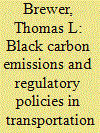| Srl | Item |
| 1 |
ID:
166540


|
|
|
|
|
| Summary/Abstract |
The paper assesses evidence concerning the effects of transportation's black carbon emissions on climate change, public health, and food production; and it discusses policy issues posed by the emissions. Black carbon emission mitigation policies at all levels offer significant potential climate, health, and food co-benefits, and they are attractive in terms of economic cost-effectiveness and political feasibility. The paper presents an analysis of regulatory issues in maritime shipping and aviation, which are increasingly salient, and which are largely independent of the revelations of “diesel gate” in the motor vehicle industry. Yet, there are linkages in the technological and policy issues of the motor vehicle industry and issues confronting maritime shipping and aviation. Black carbon emissions are among the core regulatory policy issues in all three industries, and they have not been adequately addressed by policymakers. The paper concludes with specific policy recommendations at all governance levels.
|
|
|
|
|
|
|
|
|
|
|
|
|
|
|
|
| 2 |
ID:
168676


|
|
|
|
|
| Summary/Abstract |
Residential wood combustion (RWC) is a major source of climate-impacting emissions, like short-lived climate forcers (SLCF) and biogenic CO2, in Finland. In this paper, we present projections for those emissions from 2015 to 2040. We calculated the climate impact of the emissions using regional temperature potential metrics presented in literature. In our results, the climate impacts are given as global and Arctic temperature responses caused by the studied emissions in a 25 year time span. The results show that SLCF emissions from RWC cause a significant warming impact. Using our selected metrics, SLCF emissions from RWC added to the warming impact of Finland's projected greenhouse gas emissions by 28% in global temperature response and by 170% in Arctic response. When compared with other common heating methods in Finnish detached houses, using a typical Finnish stove (masonry heater) was the least climate-friendly option. Taking biogenic CO2 emissions into account further highlighted this finding. Finally, we assessed the change in climate impact when implementing various emission reduction measures for RWC. With a time span of 25 years, early action was found to be even more crucial than the eventual reductions in annual emissions in 2040.
|
|
|
|
|
|
|
|
|
|
|
|
|
|
|
|